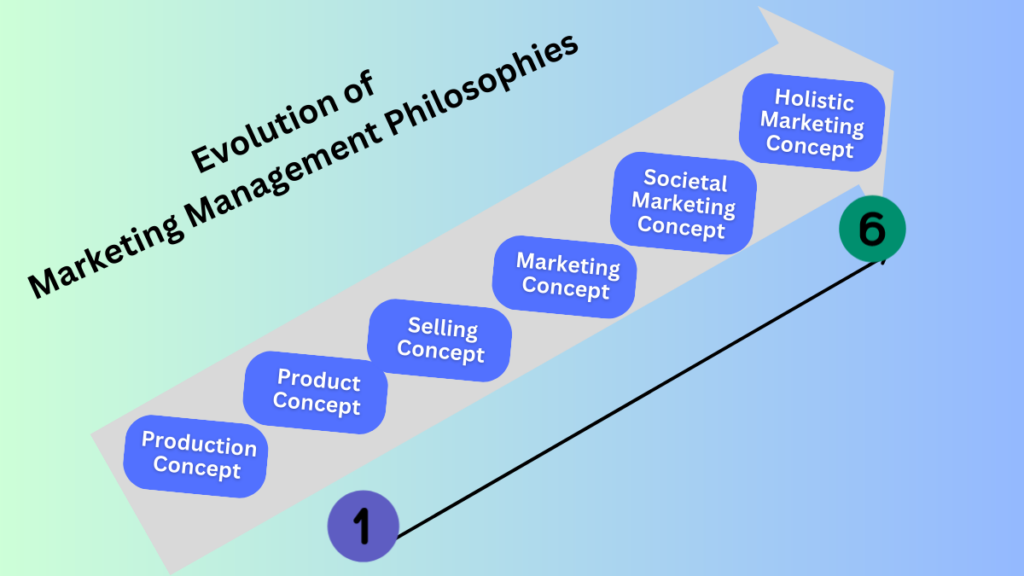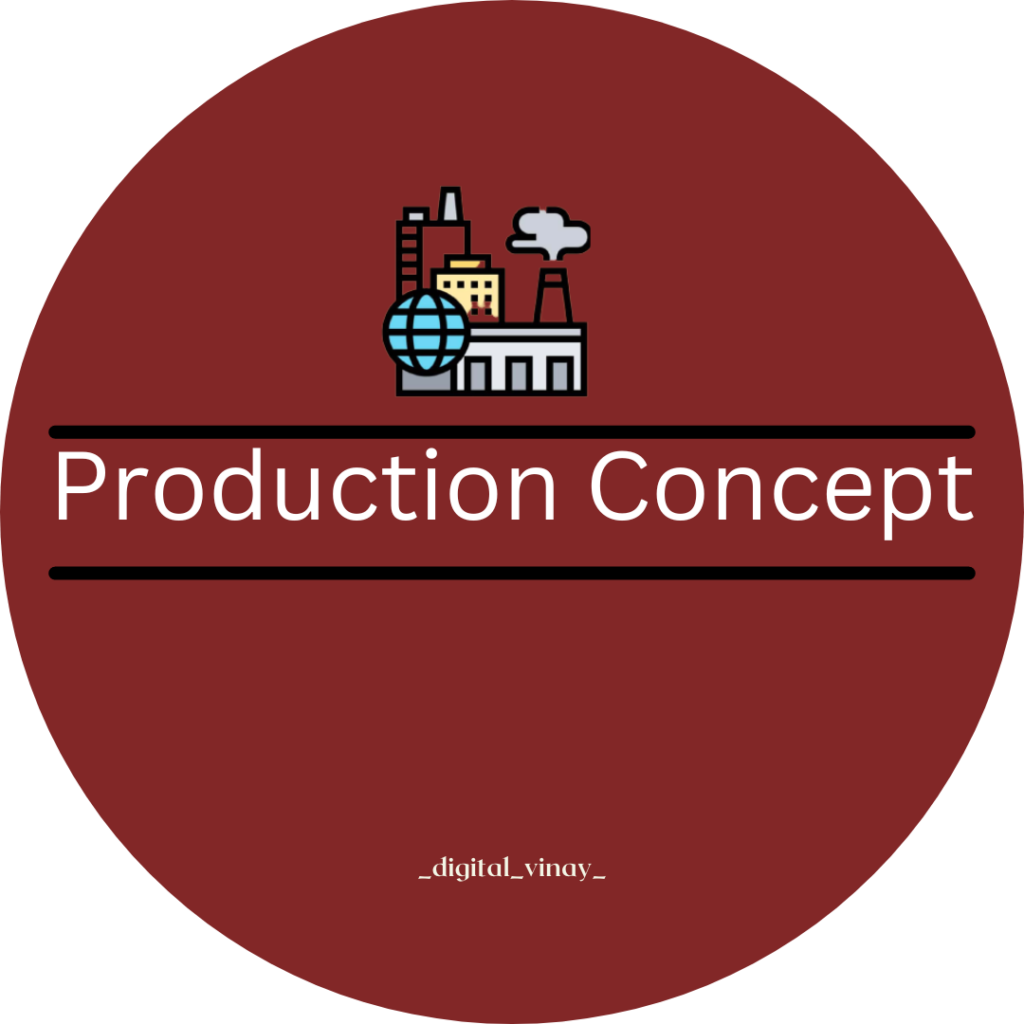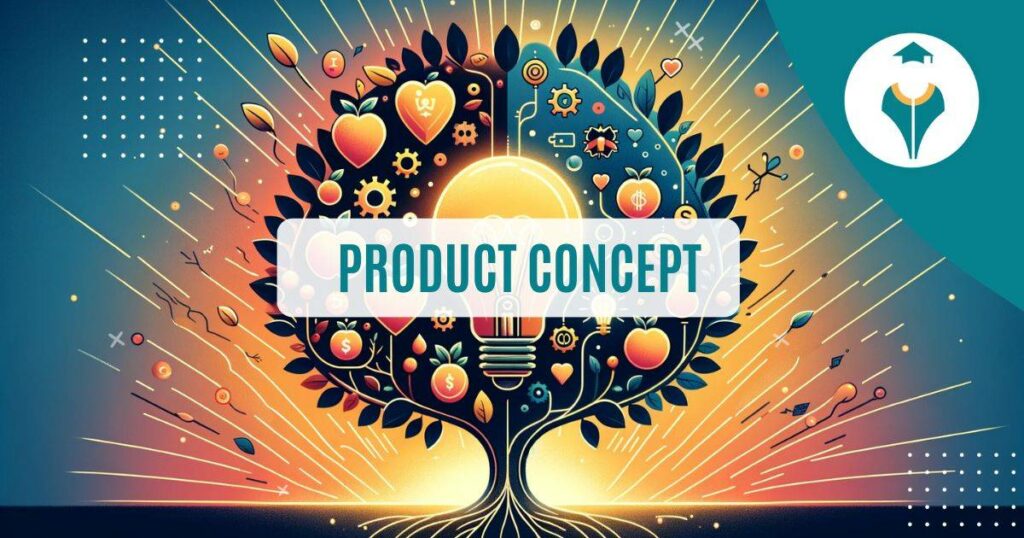Table of Contents
WHAT IS MARKETING CONCEPT
The marketing concept(MC) is a business philosophy that focuses on identifying and satisfying customer needs and wants to achieve organizational goals. It revolves around the idea that to be successful, a company must understand its target market, create products or services that meet customer needs, and effectively promote and distribute those offerings. This concept emphasizes customer orientation, market research, product development, promotion, and customer satisfaction as key elements of a successful marketing strategy.
TYPES OF MARKETING CONCEPTS
There are several types of MC that companies may adopt based on their strategic approach and business goals. Some of the key marketing concepts include:

- Production Concept
- Product Concept
- Selling Concept
- Marketing Concept
- Societal Marketing Concept
- Holistic Marketing Concept
- Production Concept (PC)
The PC of marketing is a business philosophy that focuses on producing high-quality products or services efficiently and at low costs. This concept operates under the assumption that customers will prioritize products that are readily available and affordable, regardless of marketing efforts. Key features of the PC include:

- Efficiency: Companies adopting the PC strive to achieve high levels of production efficiency to lower costs. This may involve streamlining manufacturing processes, optimizing supply chain management, and reducing wastage.
- Quality: Emphasis is placed on ensuring the quality of products or services meets or exceeds customer expectations. Companies may invest in quality control measures and continuous improvement initiatives to maintain high standards.
- Availability: The focus is on making products available to customers in a timely manner. This may involve maintaining adequate inventory levels, efficient distribution networks, and quick order fulfillment processes.
- Cost Leadership: The goal is to become a cost leader in the industry by minimizing production costs while maintaining acceptable quality levels. This can give companies a competitive advantage by offering products at lower prices than competitors.
- Limited Customer Engagement: Since the PC prioritizes efficiency and cost-effectiveness, there may be limited emphasis on understanding customer needs and preferences or building long-term relationships with customers.
It’s important to note that while the PC can be effective in certain industries or for certain types of products, it may not always align with modern marketing practices that emphasize customer-centric strategies, market research, and creating value through tailored offerings and customer experiences.
2. Product Concept
The product concept of marketing is a business philosophy that focuses on continuously improving and innovating products or services to meet or exceed customer expectations. This concept operates under the assumption that customers will favor products that offer superior quality, features, or performance. Key features of the product concept include:

- Quality Improvement: Companies adopting the product concept prioritize enhancing the quality of their products or services. This may involve using advanced technologies, materials, and production processes to deliver superior performance, durability, and reliability.
- Innovation: Emphasis is placed on innovation and product development to stay ahead of competitors and meet evolving customer needs. Companies invest in research and development (R&D) to introduce new features, designs, and functionalities that differentiate their offerings.
- Differentiation: The goal is to differentiate products from competitors by offering unique features, benefits, or value propositions. This can include branding strategies, product customization options, and exclusive features that appeal to target customers.
- Customer Focus: While the product concept emphasizes product quality and innovation, it also considers customer feedback and preferences. Companies may conduct market research, gather customer insights, and use feedback to refine and enhance their products.
- Marketing Support: Marketing efforts under the product concept focus on highlighting product features, benefits, and innovations to attract and retain customers. This may include advertising campaigns, product demonstrations, and promotional activities that showcase product superiority.
- Continuous Improvement: Companies using the product concept are committed to continuous improvement and staying abreast of market trends, technological advancements, and customer expectations. This allows them to adapt their products to changing market dynamics and maintain a competitive edge.
Overall, the product concept of marketing is centered around creating value for customers through product excellence, differentiation, and customer-focused innovation. It complements other marketing concepts by addressing the importance of product quality and innovation in driving customer satisfaction and loyalty.
3. Selling Concept (SC)
The selling concept of marketing is a business philosophy that focuses on aggressive sales and promotional efforts to persuade customers to buy a company’s products or services. This concept operates under the assumption that customers may not buy enough of a company’s offerings without significant sales and marketing efforts. Key features of the SC include:

- Sales Focus: Companies adopting the selling concept prioritize sales volume and revenue generation. The primary goal is to sell existing products or services rather than focusing on understanding and fulfilling customer needs.
- Promotion and Advertising: Emphasis is placed on promotional activities such as advertising, personal selling, and sales promotions to create awareness and stimulate demand for products. Companies invest heavily in marketing communications to persuade customers to make purchases.
- Customer Acquisition: The focus is on acquiring new customers and increasing sales to existing customers through aggressive selling tactics. This may involve targeting potential customers through mass marketing campaigns and direct sales efforts.
- Short-term Orientation: The SC often has a short-term orientation, with a strong emphasis on meeting immediate sales targets and quotas. There may be less attention given to building long-term customer relationships or addressing customer satisfaction beyond the point of sale.
- Product-Centric Approach: While customer needs are considered to some extent, the SC tends to be more product-centric, with a focus on pushing products onto customers rather than pulling customers in with value-added solutions.
- Customer Follow-up: After-sales service and customer support may be provided primarily to address issues or complaints rather than proactively engaging customers to build loyalty or repeat business.
It’s important to note that while the selling concept can be effective in certain situations, such as selling high-involvement or complex products, it may not align well with modern marketing practices that emphasize customer-centricity, relationship building, and creating long-term value for customers. Companies today often combine elements of the selling concept with other marketing philosophies to achieve a balanced approach that meets both short-term sales goals and long-term customer satisfaction objectives
4. Marketing Concept
The MC of marketing is a business philosophy that emphasizes understanding and fulfilling customer needs and wants more effectively than competitors. This concept centers on the idea that creating value for customers leads to business success. Key features of the marketing concept include:

- Customer Orientation: This is deeply rooted in being customer-centric. Companies focus on understanding their target customers, their preferences, behaviors, and needs through market research and analysis.
- Integrated Marketing Strategy: It involves developing a comprehensive marketing strategy that integrates various elements such as product development, pricing, distribution, and promotion. The goal is to create a cohesive and effective plan to reach and engage target customers.
- Value Creation: The marketing concept emphasizes creating value for customers by offering products or services that meet their needs and provide benefits that exceed their expectations. This involves developing unique value propositions and competitive advantages.
- Market Segmentation and Targeting: Companies using the marketing concept segment the market based on demographics, psychographics, behaviors, or other factors. They then target specific segments with tailored marketing strategies and messages.
- Customer Satisfaction: The ultimate goal of the marketing concept is to achieve customer satisfaction and build long-term relationships with customers. Companies prioritize delivering superior customer experiences, addressing customer feedback, and fostering loyalty.
- Market Orientation: Companies adopting the marketing concept are market-oriented, meaning they continuously monitor market trends, competitor activities, and customer feedback to adapt and refine their marketing strategies and offerings.
- Holistic Approach: The MC takes a holistic approach to marketing, considering all aspects of the marketing mix (product, price, place, promotion) and how they interact to create value for customers and achieve organizational objectives.
Overall, the marketing concept of marketing places the customer at the center of all business decisions and strategies, aiming to create mutually beneficial relationships that lead to customer satisfaction, loyalty, and business success
5. Societal Marketing Concept
The societal MC is a business philosophy that expands on the traditional marketing concept by considering not only the needs and wants of customers but also the long-term well-being of society as a whole. This concept emphasizes that companies should not only focus on profitability and customer satisfaction but also take into account their social and environmental responsibilities. Key features of the societal MC include:

- Social Responsibility: Companies adopting the societal MC recognize their role and responsibility in contributing positively to society. This includes ethical business practices, environmental sustainability, community engagement, and supporting social causes.
- Long-term Perspective: The societal MC takes a long-term view, understanding that sustainable business success is interconnected with the well-being of society. Companies consider the impact of their actions on future generations and strive for responsible practices that benefit society over time.
- Ethical Considerations: Ethical considerations play a significant role in decision-making under the societal marketing concept. Companies prioritize fairness, transparency, honesty, and integrity in their business operations, marketing strategies, and interactions with stakeholders.
- Environmental Stewardship: Environmental sustainability is a key focus area within the societal marketing concept. Companies aim to minimize their environmental footprint by adopting eco-friendly practices, reducing waste, conserving resources, and supporting initiatives that promote environmental conservation.
- Community Engagement: Companies actively engage with local communities and stakeholders to understand their needs and contribute positively to community development. This can involve supporting education, healthcare, infrastructure, and other initiatives that benefit communities.
- Consumer Education: The societal marketing concept also involves educating consumers about social and environmental issues, empowering them to make informed and responsible purchasing decisions. Companies may engage in public awareness campaigns and promote sustainable consumption practices.
- Triple Bottom Line: The SMC aligns with the concept of the triple bottom line, which considers not only financial performance (profit) but also social impact (people) and environmental sustainability (planet) as measures of business success.
Overall, the societal MC emphasizes the importance of businesses acting as responsible corporate citizens, contributing positively to society, and addressing social and environmental challenges through their operations and marketing initiatives.
6. Holistic Marketing Concept
The holistic MC is a comprehensive approach to marketing that considers all aspects of the business and its interactions with customers, stakeholders, and the broader environment. It integrates various marketing functions, strategies, and channels to create a cohesive and consistent experience for customers. Key features of the holistic marketing concept include:
- Integrated Marketing Mix: Holistic marketing integrates the traditional marketing mix elements of product, price, place, and promotion with additional dimensions such as people, processes, and physical evidence. This ensures alignment and coherence across all aspects of marketing strategy.
- Customer-Centricity: Holistic marketing places a strong emphasis on understanding and meeting customer needs, preferences, and expectations. It involves segmenting the market, targeting specific customer segments, and delivering personalized experiences to enhance customer satisfaction and loyalty.
- Relationship Building: Building long-term relationships with customers is a core aspect of holistic marketing. Companies focus on creating meaningful connections, engaging customers through multiple touchpoints, and fostering trust and loyalty over time.
- Internal Marketing: Holistic marketing recognizes the importance of internal stakeholders, including employees, as key drivers of customer satisfaction and brand value. It involves aligning internal processes, culture, and employee training to deliver exceptional customer experiences.
- Social Responsibility: Holistic marketing extends beyond traditional business objectives to include social and environmental responsibility. Companies adopting this concept integrate ethical practices, sustainability initiatives, and community engagement into their marketing strategies.
- Digital Integration: In the digital age, holistic marketing incorporates digital marketing channels, technology, data analytics, and automation to enhance customer interactions, personalize marketing efforts, and measure performance effectively.
- Brand Experience: Holistic marketing focuses on creating a consistent and compelling brand experience across all touchpoints, including online and offline channels. This involves branding strategies, storytelling, visual identity, and experiential marketing to engage customers and differentiate the brand.
- Continuous Improvement: Holistic marketing is iterative and adaptive, emphasizing continuous learning, innovation, and improvement. Companies monitor market trends, customer feedback, and performance metrics to refine their strategies and stay competitive.
Overall, the holistic marketing concept reflects a strategic and holistic approach to marketing that considers the interconnectedness of various factors, stakeholders, and touchpoints in delivering value to customers and achieving business objectives.
